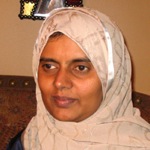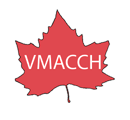Rabis Khedr
People, South Asian, Storytelling, Editorials & Essays

A Journey Toward Inclusion
Thank God I grew up in Canada because I wouldn't have had opportunities that I have enjoyed over the years in any other part of the world but Canada. Thank God I grew up in Canada because Canada is the best and I have the right to voice for more and make it even better.
I have a name, a language, a faith, an ethnicity… My face shows my gender and race. I am not a faceless disability. This is my reality and the reality of diversity in our society.
I personify this reality with the following line as my identity statement: I am a hyphen with many hijabs: Rabia Khedr, Muslim-Punjabi-Pakistani-Canadian, woman, wife, mother of four, sibling of individuals with intellectual disabilities, facilitator, consultant, human rights advocate, etc. and person with a disability - blind. The world sees me as a blind, brown woman or a brown, blind woman. The jury is not in on the order of which comes first - blind or brown.
Fact. Diversity is not exclusive of disability. However, the able-bodied world often tries to compartmentalize disability in a stand alone box. Society has just begun to consider a discourse on the fact that disability is one of the elements of identity that makes a person whole. Understanding intersectionalities of individual identity and addressing the multitude of barriers to improve access will enhance the quality of life for people with disabilities.
However, the Ethno-Racial People with Disabilities Coalition of Ontario (ERDCO) pioneered community-based research on intersectionalities without labelling it as such in the mid-1990s in order to honour the experiences of people of colour with disabilities. Check-out "Building Inclusive Communities Tips Tool" at www.erdco.ca. Please note that the site is being updated. I learned a lot from my early involvement with the organization. I hope that I have also contributed to its development in different capacities as Senior Project Coordinator, Chair, Special Consultant to the Board of Directors and volunteer.
Racism coupled with ableism was compounding the barriers that people of colour with disabilities were facing and continue to face in our society today.
We can also easily add sexism and visible expression of faith as an ism too. The list goes on. Check-out the Canadian Association of Muslims with Disabilities website at www.camd.ca for pioneering research on the experiences of Muslims with disabilities. I am a founder and current Executive Director of the organization.
For immigrants and refugees or rather newcomers with disabilities, this means that their quest for a better life leads to a different reality of barriers. In their place of origin, they were a person with a disability battling ableism and, if they happened to be a woman, sexism as well. In our society, we have added a layer of disadvantage through racism for many people with disabilities therefore contributing to greater exclusion. The experience of exclusion is twofold. Ableism, racism and sexism lead to exclusion in the common culture or mainstream society and ableism and sexism lead to exclusion in ethnocultural communities. Therefore, people of colour with disabilities have to combat oppression on multiple fronts within our Canadian context.
I bring this perspective to the many tables that I voluntarily participate on including in my role as Chair of the City of Mississauga Accessibility Advisory Committee, member of the Peel District School Board Parent Involvement Committee and board member of the Ontario Women's Health Network.
I also promote this framework through my professional work as a consultant with diversityworX, a company I founded in 2002. I offer training and consulting services to organizations that want to create an atmosphere of inclusion and wish to institutionalize systems and processes that fully respect, reflect and respond to our diverse Canadian reality. diversityworX tagline is 'access''equity''inclusion'. This means that I as a Muslim-Punjabi-Pakistani-Canadian woman … with a disability have 'access' simply by being able to get into your space or place. I have 'equity' by being able to get into your space and place fairly the same way as a person with perceived majority status without a disability. And, I experience 'inclusion' when I get into your space or place. I am fully accommodated, engaged in the environment and its activities and my contribution is recognized and valued. I feel I belong with you in our space or place.
I personally, voluntarily and professionally strive to change our society for better than the best we are as Canadians by raising the bar through human rights and the principles of cultural proficiency in order to truly create an inclusive society. I research and write the experiences of ethnocultural and racialized people with disabilities in order to heighten awareness about intersectionalities of identity and power dynamics. Check-out the article "Privacy Unbound: Personal Support Workers and Cultural Differences" in the Winter 2008-2009 issue of Abilities Magazine at www.abilities.ca and "Parenting with a Disability: Diversity, Barriers and Requirements", a community-based research report on the experiences of parents with disabilities, at www.diversityworx.com.
I speak whenever I am given the honour and opportunity to share my perspective and commentary. Some key highlights include resenting at the Nordic Network on Disability Research 2007 Conference in Sweden, participating in an international documentary about Muslim women activists in the West and speaking to an audience of over 10,000 people at the Reviving the Islamic Spirit 2007 Convention at the Metro Convention Centre in Toronto.
I believe in daring to dream and putting the dreams into action to create the future we want especially the future we want for the next generation. I want a future for my kids where they feel comfortable and confident in their skin and with their identity as a whole. I want them to be proud Canadians without having felt deprived or excluded growing-up. I want them to feel they fully belong within their identity as Muslim-Pakistani-Egyptian-Canadians. While programs and activities are considering transformation toward reflecting the needs that diversity demands, I can't afford the time for my children that change will take. I volunteer today to create culturally relevant experiences for them. I work with like-minded community members to organize recreational opportunities for them that are culturally sensitive including gender-specific swims and community family fun skate nights in Mississauga.
My leadership and advocacy efforts have been recognized by the Maytree Foundation, Canada-Wide Accessibility for Post-Secondary Students, the Federation of Muslim Women, the Canadian Council of Muslim Women, the Multicultural Inter-Agency Group of Peel and Council for the Advancement of Muslim Professionals - Toronto.
I continue to strive for an inclusive society. This would not have been possible without the opportunities I had growing up in Mississauga. The doors to education were not easy, but were open to me. I earned an Honours bachelor of Arts degree from the University of Toronto. I successfully found employment opportunities with the appropriate technological accommodations. I had people believe in me regardless of my visible identity and disability. I have had fabulous friends and a fantastic family support me every step of the way. I am giving back what I have learned and experienced to make inclusion happen for all of us.
